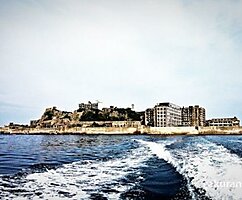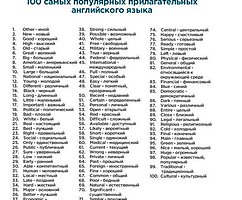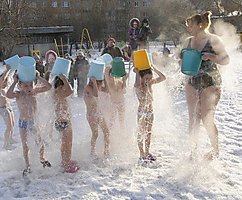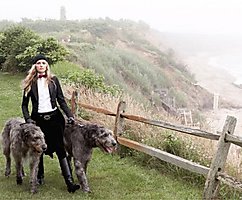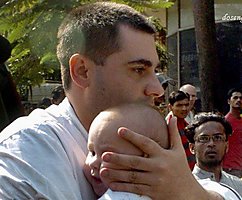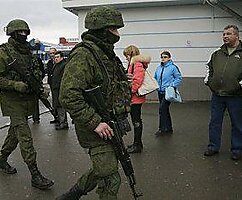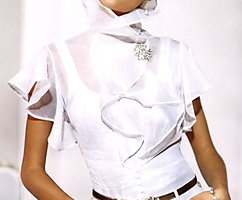Japanese prisoners of war on the Soviet Union in graphics
 Bashny.Net
Bashny.Net
Here is a real diary of the Japanese prisoner of war who was in Soviet captivity after World War II. Impressions of Russian soldiers, women, baths and many other topics under the cut. Vyiskivanie lice Samhamni.
The bitterness of defeat in the war, the harsh life in another country as a captive. It hurts me to talk about it again. It seems that such a fate has fallen only to us - youth Taisho era.
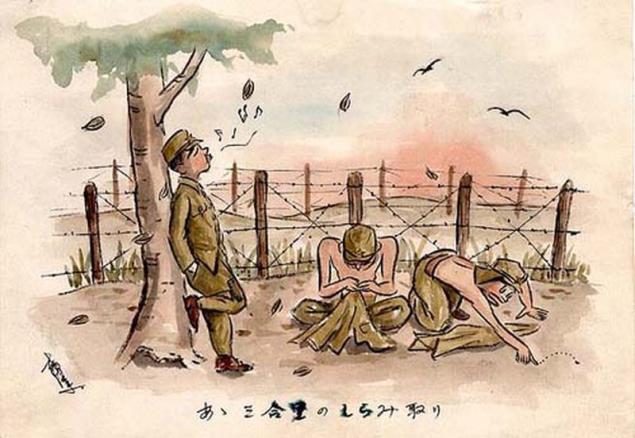
Toilet alfresco
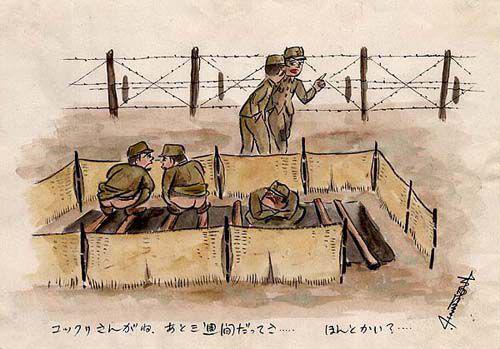
"I wondered if it turns out that I am back home after 3 weeks ..." - "Maybe it really come back ...»
And flowed usual routine prisoner of war who has nothing to lose. Toilet in the open air, fenced off straw mats, was at the same time point in the conversation comrades, such as: "Today, I wondered, and fell that I will soon be able to return home," etc.
24 people in a room 10 square meters
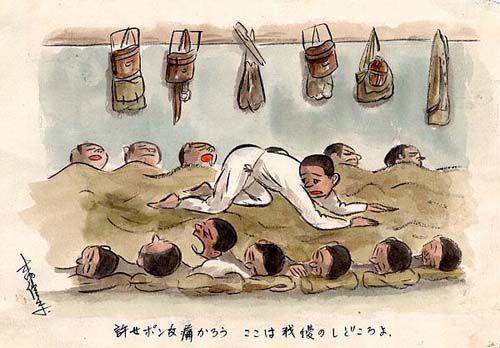
And here we go by rail from Samhamni north to Hungnam. The room of the dilapidated factory hostel housed 24 people, so was quite hot in the oven, and the need has disappeared. If you get up at night, you then can not find a place on the floor to lech.V last week of December, when the cold was terrible, we began to appear night blindness due to lack of vegetables and lean, monotonous food. As a result of my comrades constantly bump into each other, when we went to the bathroom at night.
Night blindness

Full tank of sewage. In the evening, we took out the tank to the brim full of filth, and poured them into a large pit dug in the yard. Interesting was the work.
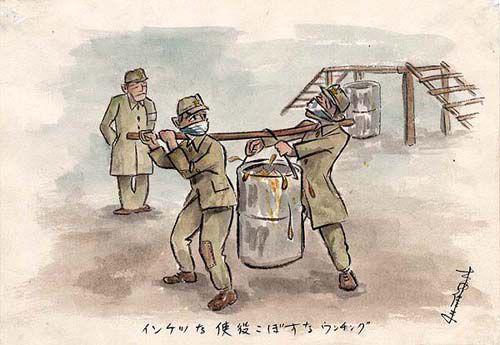
Night duty
For an hour on duty at night in the cold -20 and escorted to the toilet those who suffered blindness. It was not easy. At the sight of the beautiful moon in the sky I started sniffling and tears immediately froze on my cheeks.
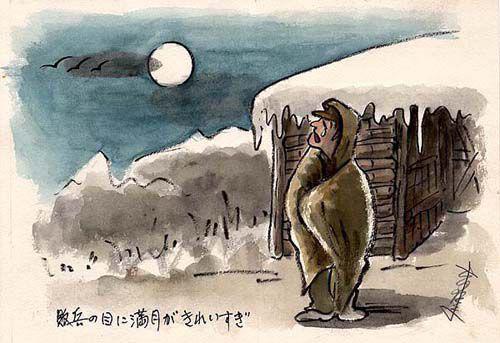
Baseball on the grass
In those days, when there was good weather, we tried to do exercises on the street. Those who pobodree often played baseball, using a baseball glove and bat.
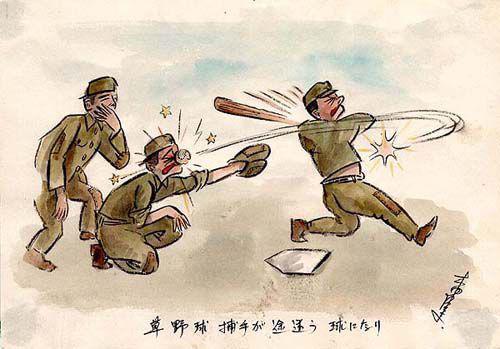
A forced march to the scorching heat
Sailed from the North Korean port of Hungnam and arrived in the small Soviet port Posiet. Then forced march, nonstop, barely dragged through a very long field in kilometers 20. To some, this was not under force, and they had to eat dirt.
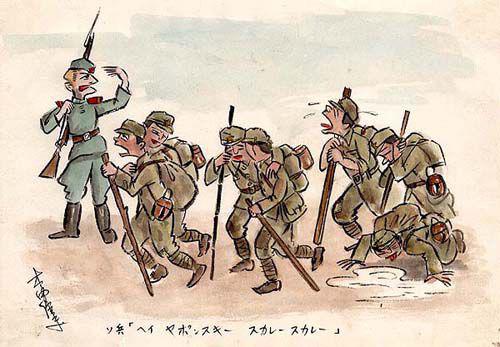
Charges rains
Arriving in a village, within two weeks of living in tents, which were soaked as a result of incessant rains. Blankets, postelennuyu on the floor, soaked with water, causing dampen our body and soul. Many then undermined his health.
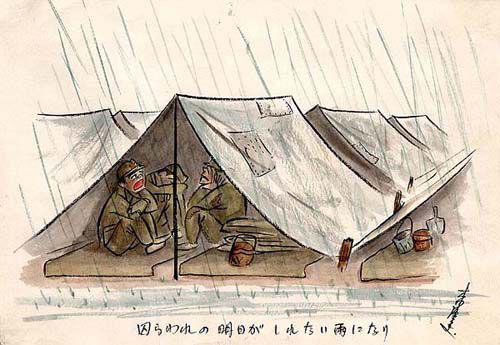
Unfunny injections
After the rain stopped, we injections syringes for horses. It hurts, I tell you. The first time I experienced. For a moment, already caught his breath. Very painful.

40 people crowded into the boxcar
By shouting "come on, come on!" 40 people plunged into a 18-ton freight car, outside the car door is firmly closed. Each second car had the charge of the Soviet soldiers, armed with machine guns. The composition of 50 wagons moved west.

Stop at Lake Baikal
The train of 50 wagons, which was traveling about 1,500 Japanese soldiers went on a long journey on the Trans-Siberian Railway. In Lake Baikal made a stop. We filled the tank with water from the lake, and we had bottled water.
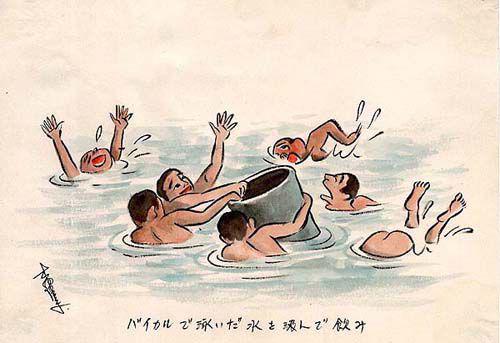
Wonderful!
What a luxury! Habitual movements of the hands he gently crumbling tobacco wrapped in a strip of paper. Then poslyunyavil her and taped the ends.
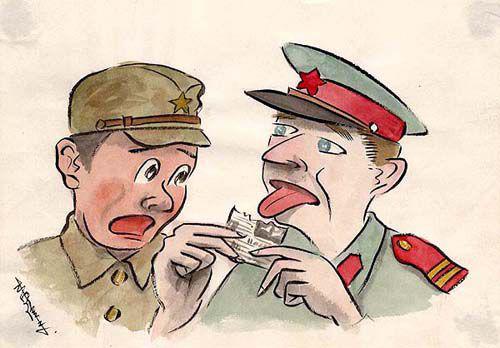
Barefoot dzemochka
Our train was full of people, moved by the Trans-Siberian Railway and overcoming the Urals, reached Europe. Journey, which lasted 30 long days ended, and we arrived in the small Ukrainian town of Slavyansk. On the field, overgrown entirely sunflowers, was lovely barefoot dzemochka (girl) and drove in front of kids.
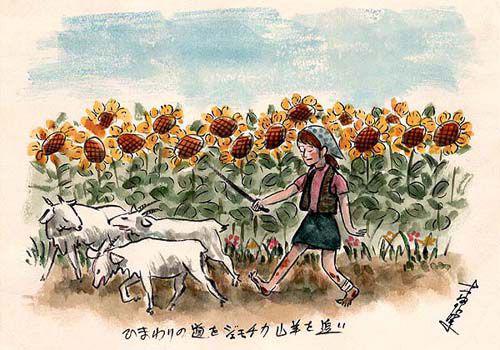
Hard work
Who does not work shall not eat. Immediately begin to work on chipping stones. With a crowbar in his hand standing in front of stone blocks and performs the daily norm - 1 cubic meter per person. Work in a team of 4 people still terrible, as the load increases by 4 times, including work as a loader and a porter.

Young Russian soldiers
Chipped stones were loaded onto a stretcher and then dragged up the hill and constructed something like a fortress wall. I gained valuable experience for the first time engaged in construction work. Russian soldiers all day watching us, sometimes dozing or reading a book out loud out loud.

Sergeant pinches his nose
What's the use of telling him that I need to use the toilet, he still does not understand the words. Fearing that I can escape, he always watched what I was doing, standing side by side. And I have because of this, the process does not work.
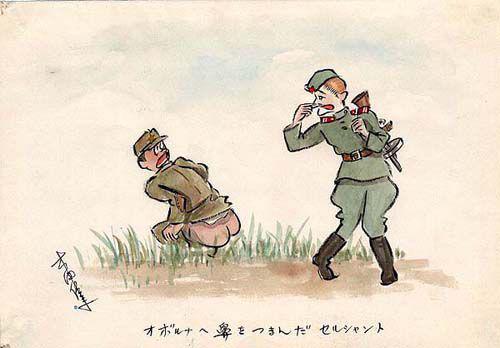
Kos.
I tried once to work Slavic oblique. At a young girl gets easily, and with me only sweat flowing. "And all because you can not turn back," - says the girl.

Potatoes.
"On," Japanese ", hold the potatoes." In any country girls are very good. It is said that in Ukraine - fertile land, so there is a lot of potatoes.
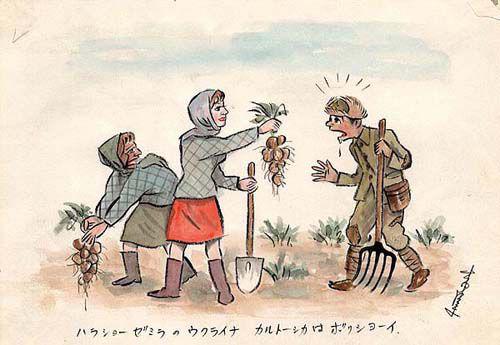
Completion of work in the field.
Finish work on the farm just learned Russian words "Goodbye", "thank you." Red sunset is truly beautiful. Sky Eastern Europe differs from the sky Manchuria. "Good-bye, Miss", "Work - end. The collective farm "- so we said goodbye in Russian.

A long way in bad weather
Comrade (former cavalryman) in bad weather rather quickly flew on a sled to the point of receiving food camp. Even strong Russian soldiers were struck by the power of the horse. "And horses something strong!».

I was born under a lucky star
Though the picture turned out beautiful, but that day was played terrible storm and in the pitch dark when at arm's length could not see anything, we worked under the escort of Soviet soldiers. Many went on that day. I, too, that day was a hair's breadth from death when fell off a cliff. Me, broken unhappy fate, supported my friends. When I came to, I thought, "Surely here I die ?!».
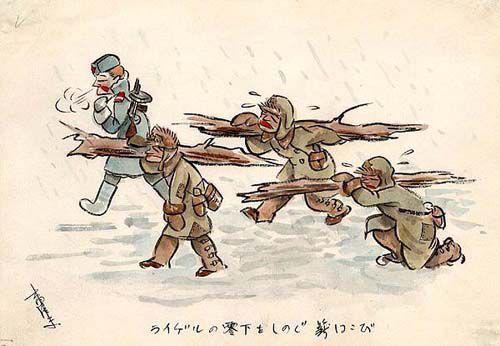
Quarry
If you constantly work at - 15. ° C, then after a while you get used to. Nevertheless, there were many people who literally "dumped" frost.
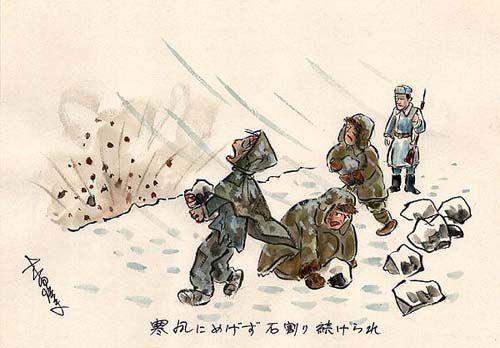
Tears-icicles
In Eastern Europe, and the temperature in winter reaches -25 ° C and -30 ° C, but for us who grew up in Japan, life in the field (in the camp) was not in vain. Sometimes it happens when with the advent of the morning, we found the bodies of my friends, benumbed. After the war was over, and die here ... so stupid ... And as we did not call back, no one to us did not return.
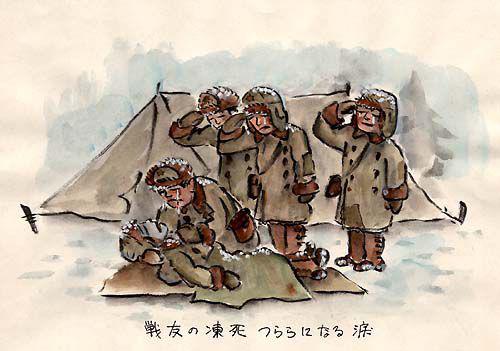
On the icy river
We were loaded into trucks and transported long. Our work with others is chipping ice on the river. Only worth a little gape, it could slip and fall. "Yes, wide river" - I thought. It was the Dnieper.
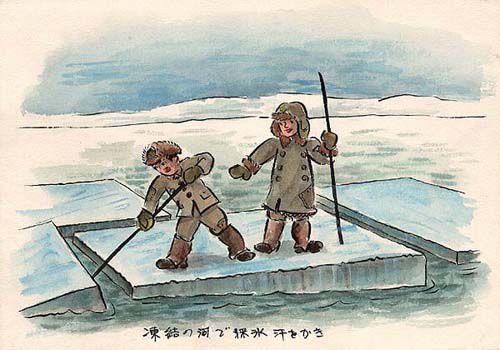
And this room?! ..
By order of the Soviet doctors we were taken to the bath. In the bath, at -25 ° C?! I tell you this is not a joke. If we were not so young and healthy, you could easily die from hypothermia. We melted snow in drums, and everyone bathed in the cold with one cup of water. And here again I felt the breath of death.
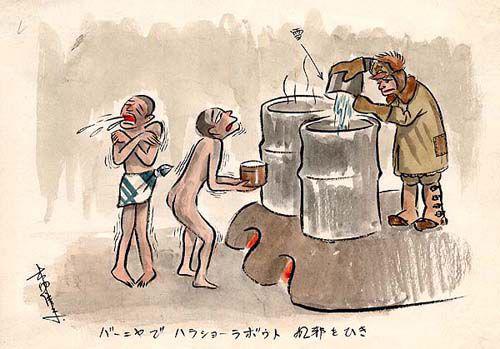
Distribution of food.
It was the most hated duty. In the dead silence all eyes are focused only on a knife edge. In half went down into the ground room, under the light of a thin homemade candles, cut the bread. Black bread.
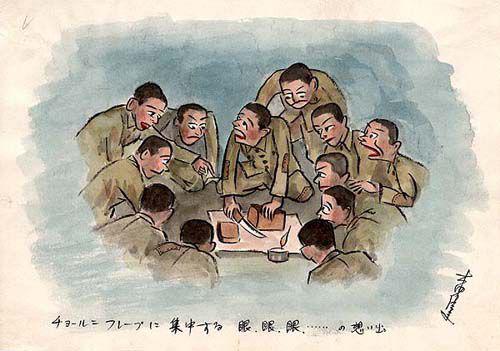
Half gone into the land of a POW camp.
In the Northern Territory the huge continent of Eurasia camp prisoners of the Japanese. Cold 30 degrees are not uncommon.

Women in the Soviet army.
Woman Sergeant Soviet Army. In a country of equality of men and women a great surprise for all to see a female soldier. The Japanese, who were still living in the good old patriarchy, this phenomenon has caused extreme shock. Resistant to cold, strong-willed, devoid of any soft, amazingly beautiful eyes were magnificent.
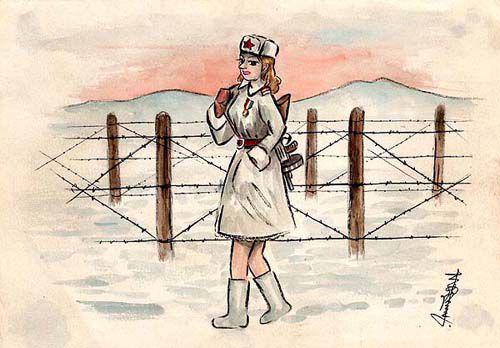
Beauty Doctor Lieutenant.
Position physicians are predominantly women. That's the beauty doctor Lieutenant with magnificent breasts, recognizing their dignity passes straightening his shoulders ... In this multi-ethnic country, there is no neglect of other nationalities. And the Japanese prisoners of war examined individually, as would any other person.

Bulkhead potatoes.
Pereberali potatoes are always in stock. This work sent those who could not make the usual hard work and half of patients. By connecting to an iron bucket electricity, could boil and eat potatoes. It was a good job.
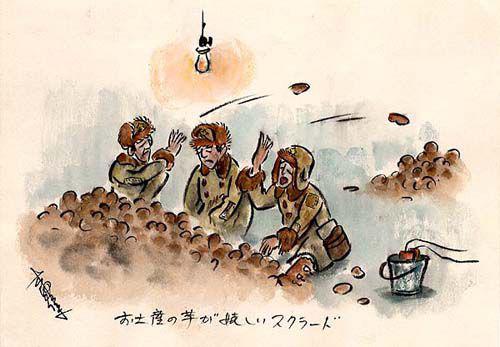
Terrible aunt officer.
We had such a terrible aunt officer. But it was fun. The glass-enclosed corridor, scraped the mud, it was necessary then gently wipe all. But with unexpected inspections were totally shalturit.
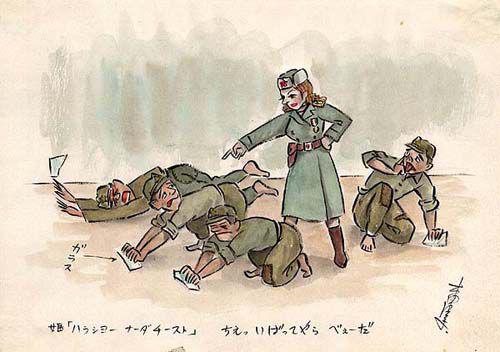
Obscene view.
One time I had to be in front of a female doctor in a not very decent form. Especially experienced it for the most emaciated soldiers aggressively putting them to bed: "Rather sleep!" Her voice was very kind.
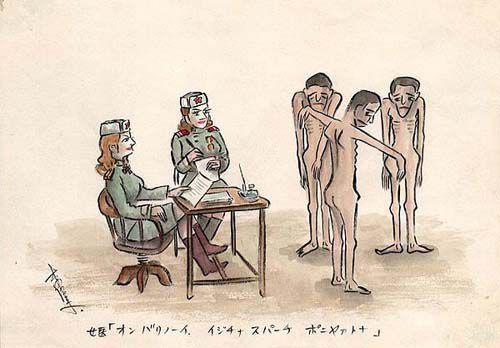
I'll tell mother ...
Tears will not stop. Cried all day long. Just awful when someone dies in your eyes. Promised to tell everything to his mother if only the whole house will be back.
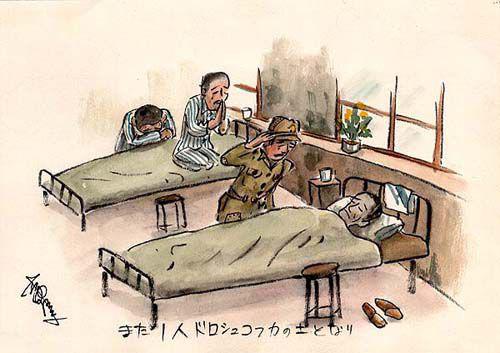
Rest in a foreign land.
Can the ashes to rest peacefully in a foreign land. No matter you are a German or Hungarian, all is one. That's funeral ... tomorrow they may be for you.
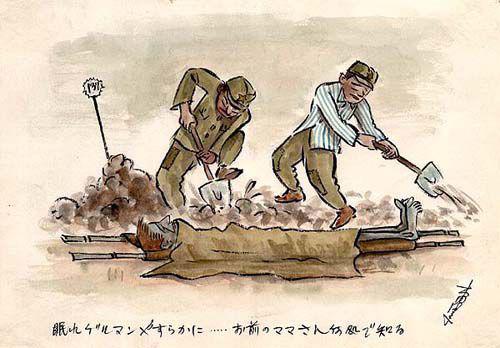
The world is full of friends
Hungarian soldiers.
It was at the end of June 1947, we surpassed the camp in Slavyansk in Magyar camp. Surprised Hungarian soldiers warmly welcomed us, the Japanese soldiers, "Marsh patriots." Feeling that each nationality has its own peculiarities.
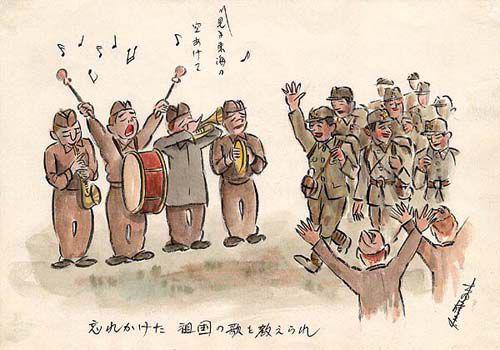
Vangriya.
Madyartsy called Vangriey Hungary. Very cheerful, cheerful people. Slipshod work (because hate the Soviet Union). But consider themselves to be "yaponolyubam" and know about Japan more than ourselves.
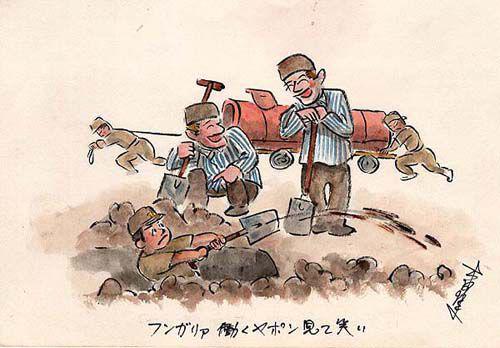
Friends came, sang in chorus.
If we talk about optimism, the Slavs out of competition. It only takes one to sing, the second picks up and turns duet on 2 votes. Immediately fit three or four others, and has been a chorus of singing. I think the Russian - the most musically gifted nation in the world. Never say "no", even if the prisoner sing.

Sumo.
Mikado, Geisha, Fujiyama, judo, hara-kiri. Slavs know these words. But when it came to sumo, it turned out that no one properly does not understand the rules. Even losing, say "thank you».
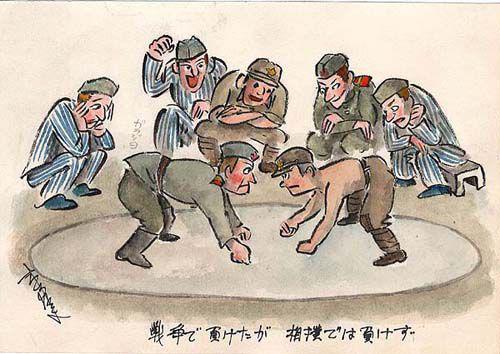
Pilot - Pokrovsky officer.
I made friends with the pilot, captain Pokrovsky. Believing in Japanese decency, he trusted me your valuables and keys to the warehouse, and he ran to work. Where is he now?
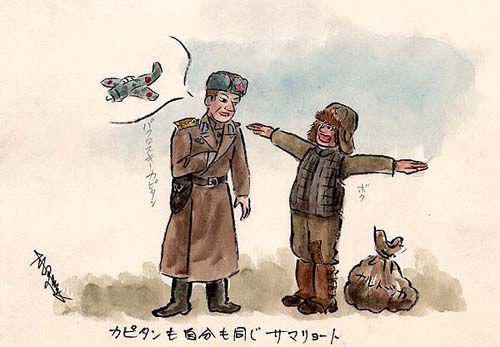
Friendly Mongolian soldiers.
In the Russian army soldiers over 120 nationalities who speak different languages. The Mongols, though understood in Russian, expressed sloppy. But the face and physique similar to the Japanese that has to communicate. Besides, they are excellent riders. A few times I fell off a horse.
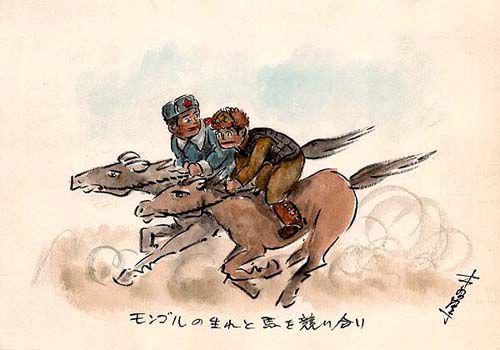
Konechki.
Children of any country and pretty straightforward. But such a lively imp school skating went, and shouted: "Hello, Japan!", Slid by. Asking about the war: "No, we are not going to fight." It's nice. Children speak Russian very easy.
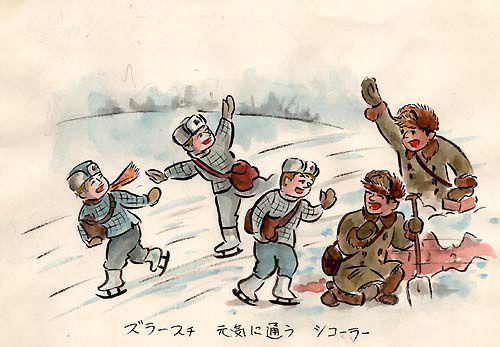
Socks.
In wet snow footcloths quite young soldier wraps his legs. I gave him a pair of socks, I usually wore just two. Asked how many years, received an answer - 14. The soldier was rubbing both hands almost frostbitten feet, and his blue eyes were full of tears. Oh mom probably remembered.
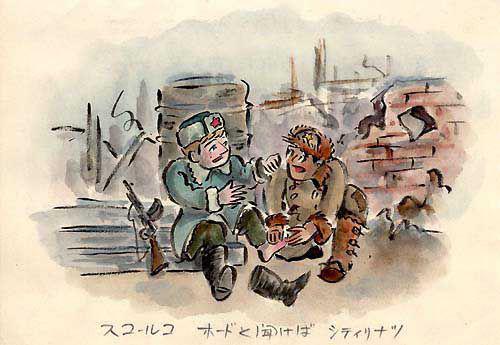
Russian children.
Such direct and naive, russkie children do not pay attention to racial differences. The fact that I was able to play with them, can be called a great luck. And the words of Russian with them a lot to remember. Very fond of children!
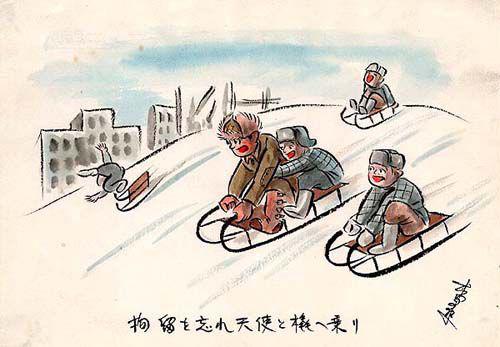
Good people in the world.
In practice games involving all: Russia, Czech Republic, Poland, Germany, Italy and Japan. I tried my best, but in the end said that everyone already seems to have lost me specifically, the youngest. Still good people in the world!
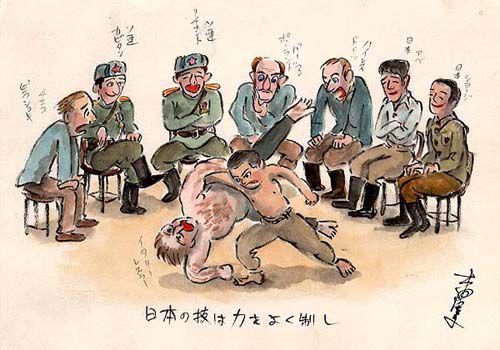
Old bunk bed.
The bed was very decrepit and badly rocked. Besides, was so narrow that one soldier standing with her fall. I do not know what kind of a dream he had seen. It was just as he fell, so that neither of whom I could not laugh.
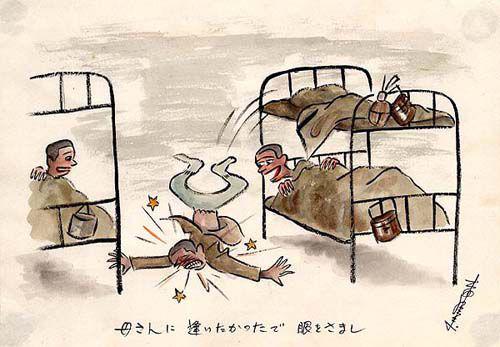
Scolded the foreman.
For failure to comply with the norms of work on the site, our foreman often summoned Major. According to our Russian foreman did not understand, and that's had to listen to him all the curses Major with detached entity. For this, and even for us it does not just have to sit in solitary confinement.
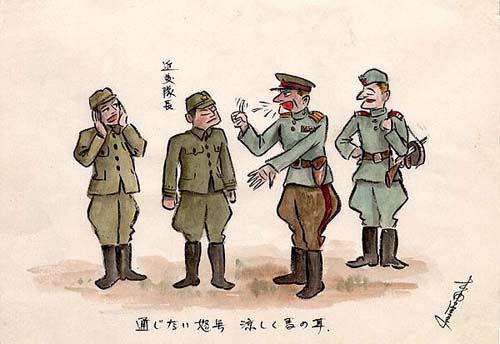
Administrator
In any country in the world has such a position as an administrator. And among the German soldiers found the eccentric old man who was involved in the distribution of work among the Japanese soldiers.
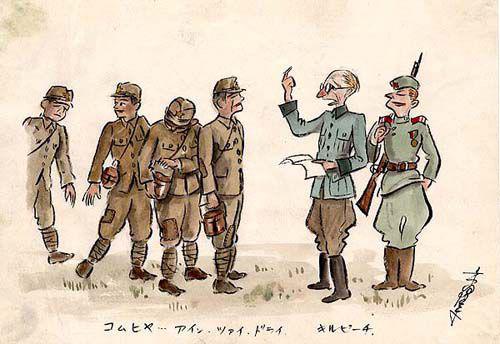
Inept mathematics
"One, two, three, four, five," - no matter how much count, still go wrong. Perhaps this is due to the fact that the Japanese soldiers are being built in four columns. Most of the young Soviet soldiers were not strong in math and so they spent a lot of time on the calculations.
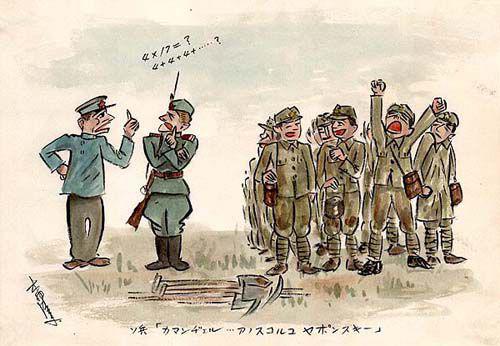
Expression of love
In the work of restoring the city at the end of the Second World War took part in both men and women. Courageous women cope with even the most dangerous work. While in Japan, it was hard to imagine a similar picture. There have even been instances of Russian women love to Japanese soldiers. Those were wonderful moments.
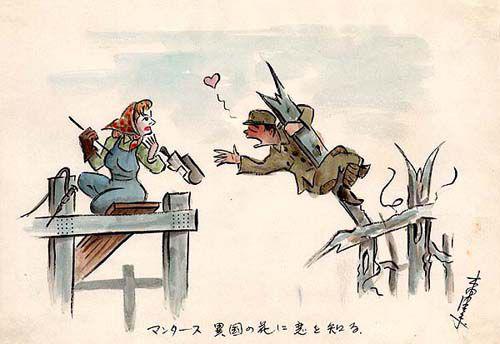
Doom
Installation works. It was a very dangerous kind of work and we had to wear work boots. Doom has identified ten of us for this work: to run on top of a wooden beam metal frame and pour cement from the trolley.
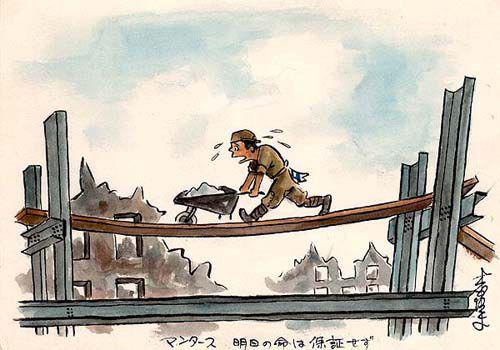
Spreading coal
This type of work is also required great physical effort: it was necessary to transfer coal from the boxcar. And when we were chased by saying, "Faster, faster," - we waved shovels, tirelessly.
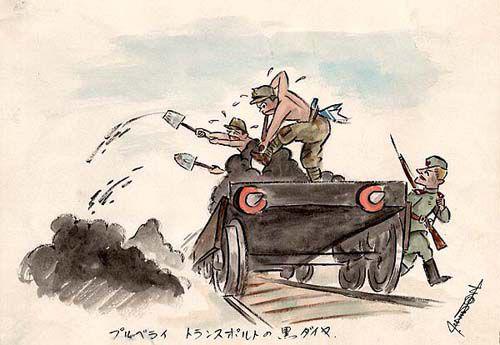
Both men and women were beautiful in
According to the plan work to rebuild the city was designed for five years, so it was attended by young girls and wholly given to work. Both men and women were beautiful in their work.
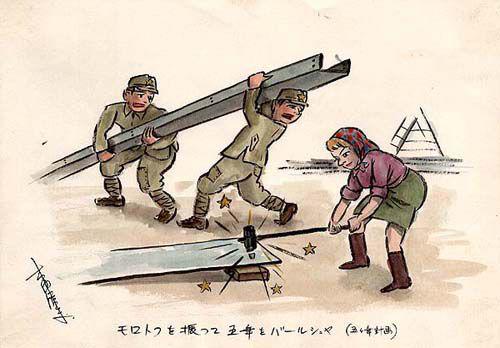
Theft
After working for a few minutes before we were engaged in the construction of theft. We stole light bulbs to make camp at least a little lighter. We wanted to eat and we pierced bag of rice with a bamboo stick, poured rice, although many could not carry away.
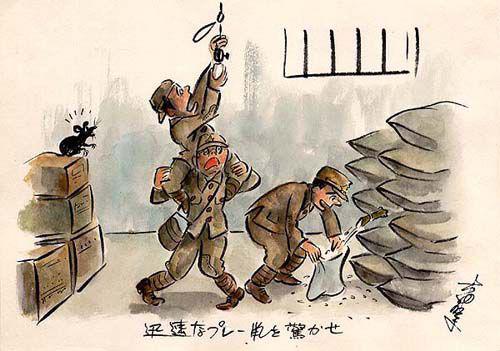
Pneumatic hammer
I think it's a train wheel. If you come closer in casting such a thing, it can develop the eyes due to hot air. We worked a pneumatic hammer, lining the surface of the wheel. Remnant I nicked my eyes, I stopped seeing the doctor and German-operated me.
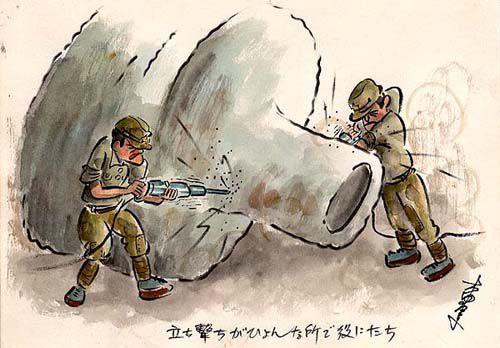
Hospital Druzhkovka
The next two months I spent in the hospital Drossikovke (?). For two weeks I lost my sight. I realized the value of possessing the ability to see. I made friends with a kind-hearted comrades and a young German soldier. When I could see again, I decided to take patronage over the weak patients in gratitude for the assistance provided to me. Day after day I was glad at the thought that I could be useful to them.
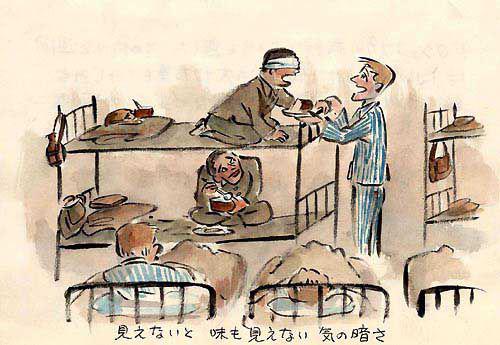
Night work
I'm not fond of night work: terribly sleepy. We went to her in turn. Rules were strict, and so were a lot of soldiers are injured when they started to rush to do the work. Sometimes it happens, and so that people died.
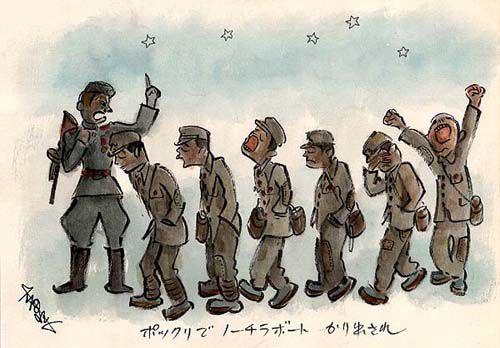
Work to transfer things from the warehouse
Work to transfer things from the warehouse was to transfer only heavy things, so without the presence of physical strength it was not cope. Japanese soldiers worked so well that the doctor-Russian began to worry about it.
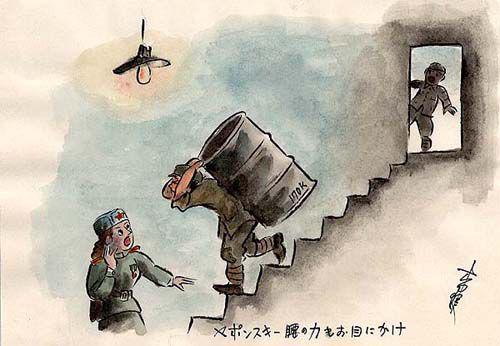
German, Japanese pretending
The Japanese like to eat rice, so we were given this food, which was at that time in Russia its weight in gold. However, rice gave us quite a bit, so sometimes pretending Japanese for rice came a German soldier. But he got it badly for it.

It hurt to sit
Once or twice a month we went to the baths. Sit on the benches were hurt because of thinness bones fell directly on a solid surface bench.
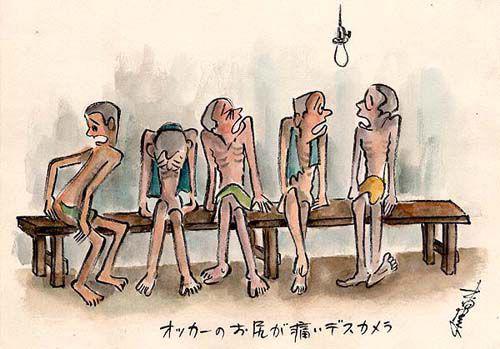
Table tennis tournament.
Cheerful Japanese prisoners of war with the Germans staged a table tennis tournament. Perhaps because of the strange manners to hold the racket, the Japanese won easily.
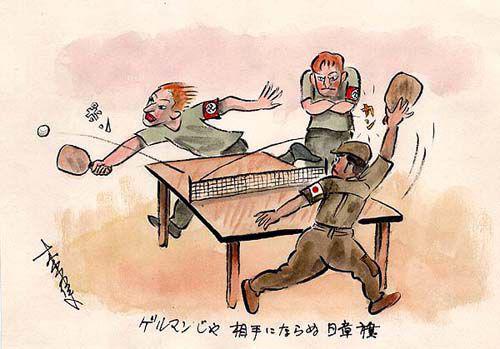
Culinary dislike.
Still the envy of someone else's plate is the same everywhere. Due to the fact that Japanese dishes look more Germans throw them a nasty look.
Yay!
The bitterness of defeat in the war, the harsh life in another country as a captive. It hurts me to talk about it again. It seems that such a fate has fallen only to us - youth Taisho era.

Toilet alfresco

"I wondered if it turns out that I am back home after 3 weeks ..." - "Maybe it really come back ...»
And flowed usual routine prisoner of war who has nothing to lose. Toilet in the open air, fenced off straw mats, was at the same time point in the conversation comrades, such as: "Today, I wondered, and fell that I will soon be able to return home," etc.
24 people in a room 10 square meters

And here we go by rail from Samhamni north to Hungnam. The room of the dilapidated factory hostel housed 24 people, so was quite hot in the oven, and the need has disappeared. If you get up at night, you then can not find a place on the floor to lech.V last week of December, when the cold was terrible, we began to appear night blindness due to lack of vegetables and lean, monotonous food. As a result of my comrades constantly bump into each other, when we went to the bathroom at night.
Night blindness

Full tank of sewage. In the evening, we took out the tank to the brim full of filth, and poured them into a large pit dug in the yard. Interesting was the work.

Night duty
For an hour on duty at night in the cold -20 and escorted to the toilet those who suffered blindness. It was not easy. At the sight of the beautiful moon in the sky I started sniffling and tears immediately froze on my cheeks.

Baseball on the grass
In those days, when there was good weather, we tried to do exercises on the street. Those who pobodree often played baseball, using a baseball glove and bat.

A forced march to the scorching heat
Sailed from the North Korean port of Hungnam and arrived in the small Soviet port Posiet. Then forced march, nonstop, barely dragged through a very long field in kilometers 20. To some, this was not under force, and they had to eat dirt.

Charges rains
Arriving in a village, within two weeks of living in tents, which were soaked as a result of incessant rains. Blankets, postelennuyu on the floor, soaked with water, causing dampen our body and soul. Many then undermined his health.

Unfunny injections
After the rain stopped, we injections syringes for horses. It hurts, I tell you. The first time I experienced. For a moment, already caught his breath. Very painful.

40 people crowded into the boxcar
By shouting "come on, come on!" 40 people plunged into a 18-ton freight car, outside the car door is firmly closed. Each second car had the charge of the Soviet soldiers, armed with machine guns. The composition of 50 wagons moved west.

Stop at Lake Baikal
The train of 50 wagons, which was traveling about 1,500 Japanese soldiers went on a long journey on the Trans-Siberian Railway. In Lake Baikal made a stop. We filled the tank with water from the lake, and we had bottled water.

Wonderful!
What a luxury! Habitual movements of the hands he gently crumbling tobacco wrapped in a strip of paper. Then poslyunyavil her and taped the ends.

Barefoot dzemochka
Our train was full of people, moved by the Trans-Siberian Railway and overcoming the Urals, reached Europe. Journey, which lasted 30 long days ended, and we arrived in the small Ukrainian town of Slavyansk. On the field, overgrown entirely sunflowers, was lovely barefoot dzemochka (girl) and drove in front of kids.

Hard work
Who does not work shall not eat. Immediately begin to work on chipping stones. With a crowbar in his hand standing in front of stone blocks and performs the daily norm - 1 cubic meter per person. Work in a team of 4 people still terrible, as the load increases by 4 times, including work as a loader and a porter.

Young Russian soldiers
Chipped stones were loaded onto a stretcher and then dragged up the hill and constructed something like a fortress wall. I gained valuable experience for the first time engaged in construction work. Russian soldiers all day watching us, sometimes dozing or reading a book out loud out loud.

Sergeant pinches his nose
What's the use of telling him that I need to use the toilet, he still does not understand the words. Fearing that I can escape, he always watched what I was doing, standing side by side. And I have because of this, the process does not work.

Kos.
I tried once to work Slavic oblique. At a young girl gets easily, and with me only sweat flowing. "And all because you can not turn back," - says the girl.

Potatoes.
"On," Japanese ", hold the potatoes." In any country girls are very good. It is said that in Ukraine - fertile land, so there is a lot of potatoes.

Completion of work in the field.
Finish work on the farm just learned Russian words "Goodbye", "thank you." Red sunset is truly beautiful. Sky Eastern Europe differs from the sky Manchuria. "Good-bye, Miss", "Work - end. The collective farm "- so we said goodbye in Russian.

A long way in bad weather
Comrade (former cavalryman) in bad weather rather quickly flew on a sled to the point of receiving food camp. Even strong Russian soldiers were struck by the power of the horse. "And horses something strong!».

I was born under a lucky star
Though the picture turned out beautiful, but that day was played terrible storm and in the pitch dark when at arm's length could not see anything, we worked under the escort of Soviet soldiers. Many went on that day. I, too, that day was a hair's breadth from death when fell off a cliff. Me, broken unhappy fate, supported my friends. When I came to, I thought, "Surely here I die ?!».

Quarry
If you constantly work at - 15. ° C, then after a while you get used to. Nevertheless, there were many people who literally "dumped" frost.

Tears-icicles
In Eastern Europe, and the temperature in winter reaches -25 ° C and -30 ° C, but for us who grew up in Japan, life in the field (in the camp) was not in vain. Sometimes it happens when with the advent of the morning, we found the bodies of my friends, benumbed. After the war was over, and die here ... so stupid ... And as we did not call back, no one to us did not return.

On the icy river
We were loaded into trucks and transported long. Our work with others is chipping ice on the river. Only worth a little gape, it could slip and fall. "Yes, wide river" - I thought. It was the Dnieper.

And this room?! ..
By order of the Soviet doctors we were taken to the bath. In the bath, at -25 ° C?! I tell you this is not a joke. If we were not so young and healthy, you could easily die from hypothermia. We melted snow in drums, and everyone bathed in the cold with one cup of water. And here again I felt the breath of death.

Distribution of food.
It was the most hated duty. In the dead silence all eyes are focused only on a knife edge. In half went down into the ground room, under the light of a thin homemade candles, cut the bread. Black bread.

Half gone into the land of a POW camp.
In the Northern Territory the huge continent of Eurasia camp prisoners of the Japanese. Cold 30 degrees are not uncommon.

Women in the Soviet army.
Woman Sergeant Soviet Army. In a country of equality of men and women a great surprise for all to see a female soldier. The Japanese, who were still living in the good old patriarchy, this phenomenon has caused extreme shock. Resistant to cold, strong-willed, devoid of any soft, amazingly beautiful eyes were magnificent.

Beauty Doctor Lieutenant.
Position physicians are predominantly women. That's the beauty doctor Lieutenant with magnificent breasts, recognizing their dignity passes straightening his shoulders ... In this multi-ethnic country, there is no neglect of other nationalities. And the Japanese prisoners of war examined individually, as would any other person.

Bulkhead potatoes.
Pereberali potatoes are always in stock. This work sent those who could not make the usual hard work and half of patients. By connecting to an iron bucket electricity, could boil and eat potatoes. It was a good job.

Terrible aunt officer.
We had such a terrible aunt officer. But it was fun. The glass-enclosed corridor, scraped the mud, it was necessary then gently wipe all. But with unexpected inspections were totally shalturit.

Obscene view.
One time I had to be in front of a female doctor in a not very decent form. Especially experienced it for the most emaciated soldiers aggressively putting them to bed: "Rather sleep!" Her voice was very kind.

I'll tell mother ...
Tears will not stop. Cried all day long. Just awful when someone dies in your eyes. Promised to tell everything to his mother if only the whole house will be back.

Rest in a foreign land.
Can the ashes to rest peacefully in a foreign land. No matter you are a German or Hungarian, all is one. That's funeral ... tomorrow they may be for you.

The world is full of friends
Hungarian soldiers.
It was at the end of June 1947, we surpassed the camp in Slavyansk in Magyar camp. Surprised Hungarian soldiers warmly welcomed us, the Japanese soldiers, "Marsh patriots." Feeling that each nationality has its own peculiarities.

Vangriya.
Madyartsy called Vangriey Hungary. Very cheerful, cheerful people. Slipshod work (because hate the Soviet Union). But consider themselves to be "yaponolyubam" and know about Japan more than ourselves.

Friends came, sang in chorus.
If we talk about optimism, the Slavs out of competition. It only takes one to sing, the second picks up and turns duet on 2 votes. Immediately fit three or four others, and has been a chorus of singing. I think the Russian - the most musically gifted nation in the world. Never say "no", even if the prisoner sing.

Sumo.
Mikado, Geisha, Fujiyama, judo, hara-kiri. Slavs know these words. But when it came to sumo, it turned out that no one properly does not understand the rules. Even losing, say "thank you».

Pilot - Pokrovsky officer.
I made friends with the pilot, captain Pokrovsky. Believing in Japanese decency, he trusted me your valuables and keys to the warehouse, and he ran to work. Where is he now?

Friendly Mongolian soldiers.
In the Russian army soldiers over 120 nationalities who speak different languages. The Mongols, though understood in Russian, expressed sloppy. But the face and physique similar to the Japanese that has to communicate. Besides, they are excellent riders. A few times I fell off a horse.

Konechki.
Children of any country and pretty straightforward. But such a lively imp school skating went, and shouted: "Hello, Japan!", Slid by. Asking about the war: "No, we are not going to fight." It's nice. Children speak Russian very easy.

Socks.
In wet snow footcloths quite young soldier wraps his legs. I gave him a pair of socks, I usually wore just two. Asked how many years, received an answer - 14. The soldier was rubbing both hands almost frostbitten feet, and his blue eyes were full of tears. Oh mom probably remembered.

Russian children.
Such direct and naive, russkie children do not pay attention to racial differences. The fact that I was able to play with them, can be called a great luck. And the words of Russian with them a lot to remember. Very fond of children!

Good people in the world.
In practice games involving all: Russia, Czech Republic, Poland, Germany, Italy and Japan. I tried my best, but in the end said that everyone already seems to have lost me specifically, the youngest. Still good people in the world!

Old bunk bed.
The bed was very decrepit and badly rocked. Besides, was so narrow that one soldier standing with her fall. I do not know what kind of a dream he had seen. It was just as he fell, so that neither of whom I could not laugh.

Scolded the foreman.
For failure to comply with the norms of work on the site, our foreman often summoned Major. According to our Russian foreman did not understand, and that's had to listen to him all the curses Major with detached entity. For this, and even for us it does not just have to sit in solitary confinement.

Administrator
In any country in the world has such a position as an administrator. And among the German soldiers found the eccentric old man who was involved in the distribution of work among the Japanese soldiers.

Inept mathematics
"One, two, three, four, five," - no matter how much count, still go wrong. Perhaps this is due to the fact that the Japanese soldiers are being built in four columns. Most of the young Soviet soldiers were not strong in math and so they spent a lot of time on the calculations.

Expression of love
In the work of restoring the city at the end of the Second World War took part in both men and women. Courageous women cope with even the most dangerous work. While in Japan, it was hard to imagine a similar picture. There have even been instances of Russian women love to Japanese soldiers. Those were wonderful moments.

Doom
Installation works. It was a very dangerous kind of work and we had to wear work boots. Doom has identified ten of us for this work: to run on top of a wooden beam metal frame and pour cement from the trolley.

Spreading coal
This type of work is also required great physical effort: it was necessary to transfer coal from the boxcar. And when we were chased by saying, "Faster, faster," - we waved shovels, tirelessly.

Both men and women were beautiful in
According to the plan work to rebuild the city was designed for five years, so it was attended by young girls and wholly given to work. Both men and women were beautiful in their work.

Theft
After working for a few minutes before we were engaged in the construction of theft. We stole light bulbs to make camp at least a little lighter. We wanted to eat and we pierced bag of rice with a bamboo stick, poured rice, although many could not carry away.

Pneumatic hammer
I think it's a train wheel. If you come closer in casting such a thing, it can develop the eyes due to hot air. We worked a pneumatic hammer, lining the surface of the wheel. Remnant I nicked my eyes, I stopped seeing the doctor and German-operated me.

Hospital Druzhkovka
The next two months I spent in the hospital Drossikovke (?). For two weeks I lost my sight. I realized the value of possessing the ability to see. I made friends with a kind-hearted comrades and a young German soldier. When I could see again, I decided to take patronage over the weak patients in gratitude for the assistance provided to me. Day after day I was glad at the thought that I could be useful to them.

Night work
I'm not fond of night work: terribly sleepy. We went to her in turn. Rules were strict, and so were a lot of soldiers are injured when they started to rush to do the work. Sometimes it happens, and so that people died.

Work to transfer things from the warehouse
Work to transfer things from the warehouse was to transfer only heavy things, so without the presence of physical strength it was not cope. Japanese soldiers worked so well that the doctor-Russian began to worry about it.

German, Japanese pretending
The Japanese like to eat rice, so we were given this food, which was at that time in Russia its weight in gold. However, rice gave us quite a bit, so sometimes pretending Japanese for rice came a German soldier. But he got it badly for it.

It hurt to sit
Once or twice a month we went to the baths. Sit on the benches were hurt because of thinness bones fell directly on a solid surface bench.

Table tennis tournament.
Cheerful Japanese prisoners of war with the Germans staged a table tennis tournament. Perhaps because of the strange manners to hold the racket, the Japanese won easily.

Culinary dislike.
Still the envy of someone else's plate is the same everywhere. Due to the fact that Japanese dishes look more Germans throw them a nasty look.
Yay!
Tags
See also
Sumo wrestlers came to the Japanese port, which was destroyed by the tsunami.
What do Americans think of the Russian Army (10 photos)
Undermining an enemy pillbox
What Americans think about the Russian army ...
On one day in his childhood ...
Dushanbe-Pamir Dushanbe
The first atomic
20 Japanese desserts that are too beautiful to eat them
Billionaire without a billion: as the founder of Duty Free rid of their money
